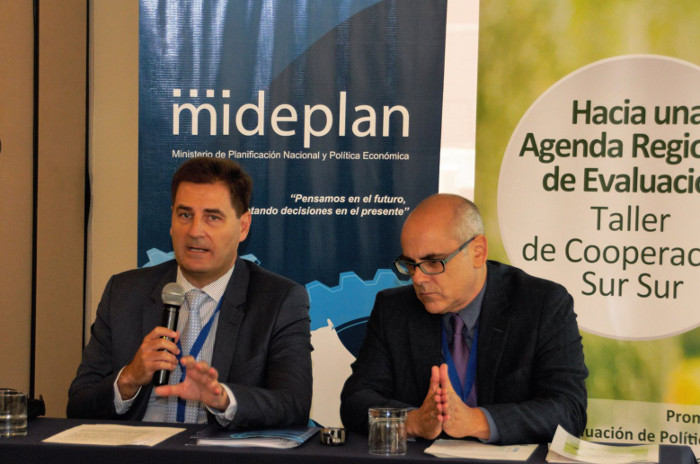
03/08/2017
San José hosted the "Towards a Regional Evaluation Agenda" workshop held within the framework of the project for promotion of public policy evaluation in Latin America and the Caribbean
The Costa Rican capital of San José hosted the workshop Towards a Regional Evaluation Agenda, within the framework of the project for Promotion of Public Policy Evaluation in Latin America and the Caribbean, the main objective of which is to generate evidence for decision-making in public institutions.
The workshop’s main objective was the exchange of experiences between the six countries participating in the project (Colombia, Costa Rica, Ecuador, Paraguay, Peru, Uruguay) for drafting the National Evaluation Agendas, which will enable improvement and harmonisation of public policies to address regional and global challenges.
Additionally, two joint evaluation processes were designed between the participating institutions, which are part of the Inter-agency Working Group for Public Policy Evaluation in Latin America formed in 2015 based on work in this area done by FIIAPP. This represents an innovative experience that introduces the comparative approach between national policies on evaluation.
Specifically, the joint evaluations outlined in this meeting addressed policies on gender equality (Costa Rica and Colombia) and disaster prevention (Ecuador and Colombia, which will be joined in coming months by Peru, Costa Rica and Uruguay), two key issues in the region. Implementation of both evaluations has already begun, and the terms and bases for harmonisation of procedures have been defined.

The deputy minister of National Planning and Economic Policy of Costa Rica (MIDEPLAN), María del Pilar Garrido, highlighted the importance of the intra-regional cooperation model being applied in the project, in which the joint work between institutions enables harmonisation of the action frameworks and even of the various national agendas for evaluation.
FIIAPP director Pedro Flores highlighted the importance of public interventions being evidence-based to ensure that they have a positive impact on citizens.
As such, the fact that policies can be observed and shared among various regional stakeholders from a comparative or joint perspective enables identification of the specific aspects of the public action with the greatest impact on improving the living conditions of populations.
The workshop also included the participation of the National Women’s Institute of Costa Rica (INAMU), which brought a specialised perspective to the definition of the evaluation of gender policies.
Likewise, the event was attended by representatives of the European Union Delegation to Costa Rica, the Latin American Social Sciences Institute (FLACSO), Costa Rica’s State of the Nation Programme, UNFPA, UN Women, and of other participating institutions in the project: Office of Planning and Budget (OPP) of Uruguay, Directorate-General for Budget of the Ministry of Finance (MH) of Paraguay, National Secretariat for Planning and Development (SENPLADES) of Ecuador, Ministry of Economy and Finance (MEF) of Peru and the National Planning Department (DNP) of Colombia.